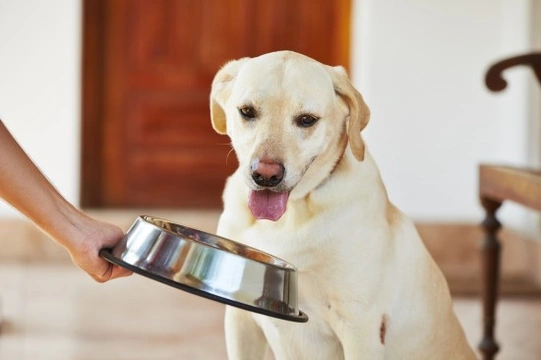
10 Tips to Help Manage Adverse Food Reactions in Dogs
1. Is the Problem Actually an Adverse Food Reaction or Something Else?
The symptoms of an adverse food reaction are often similar to those affecting dogs with a range of other conditions. Skin problems often imitate those arising from parasitic causes and environmental allergies, whilst gastric problems may mirror those arising from infectious or medical causes. Dogs with food allergies are frequently affected with skin problems but may also experience gastrointestinal symptoms. Dogs with dietary intolerance are usually presented with gastro-intestinal problems, but there are sometimes exceptions. It is therefore important to seek veterinary advice in order to rule out other causes of the symptoms, and especially so if your dog is vomiting, lethargic and / or appears in discomfort. Antibiotic / anti-inflammatory therapy may be needed to treat secondary infection and inflammation.
2. Seek Veterinary Advice
Your vet should be the first port of call since appropriate treatment will be necessary to ensure the dog is comfortable and that any concurrent infection if present is medicated. For dogs suffering from diarrhoea, a period on a low fat diet (which is free from ingredients suspected to be causing or exacerbating symptoms) will be beneficial. This is because when an animal experiences loose stools, the fat digestion enzymes will be struggling. Minimising the fat intake can help prevent more fat residue from accumulating in the large bowel where an osmotic reaction can then cause further secretory diarrhoea.
3. Keep a Food Diary
Scrutinise exactly what your dog eats. Look not only at the main diet, but treats and training rewards, recreational chews, left-overs and dietary supplements (e.g. toothpaste, homeopathic remedies). Also assess whether the dog is able to access other food-stuffs (e.g. those intended for other pets in the household such as cat food or bird seed, scavenging / stealing from the bin). Dogs can even take a fancy to certain plants.
4. Minimise Stress
Strengthening and supporting the digestive and immune function can raise an animal’s reactive threshold. Stress can reduce the threshold, so it’s vital to take extra care of the dog’s psychological health as well as his physical well-being.
5. Avoid the Most Common Ingredients Associated With Adverse Food Reactions in Dogs
The most common culprits remain to be wheat, beef and dairy products which have accounted for more than 65% of reported cases of adverse food reactions in 10 studies. Soya is another frequent offender. Do bear in mind however that dogs can be allergic to ANY dietary protein, and intolerant to ANY ingredient at all. When we think of grains, we typically classify them as carbohydrate sources, but they do contain storage proteins (prolamins) which are able to incite an allergic response. Dairy products are common offenders mainly because as dogs age, their levels of lactase (the enzyme responsible for the digestion of milk sugar) decreases which can result in lactose intolerance.
6. Read Labels Carefully
Some commercial dog food and treats contain unspecified ingredients; e.g. cereals, derivatives of animal or vegetable origin. It is impossible to know what they compromise.
7. Cut Out Rawhide and Pigs’ Ears
A lot of dogs love these recreational chews, but for dogs who are suffering from suspected adverse food reactions, they are best avoided. This is because they are largely comprised of indigestible protein, and have very little nutritional value. They have great potential to incite an allergic response because of the residual antigenic proteins and large polypeptide molecules that end up hanging around in the body since they can serve no useful purpose. This shows the importance of feeding the sensitive dog only highly digestible and nutritionally valuable ingredients.
8. Avoid High Histamine Foods
Histamine is a chemical which occurs naturally in certain foods, but is also a chemical which is released in the body as part of an allergic reaction. Some dogs, just like some people may have a low level of diamine oxidase, which is the enzyme responsible for breaking down histamine absorbed from food. Consuming histamine-rich foods can result in allergy symptoms in sensitive animals, and it’s therefore best for them to avoid tinned fish (e.g. tuna, mackerel), cheese and processed meats (e.g. hotdog sausages). Spinach and tomato are also histamine-rich.
9. Select Diet Carefully
If your dog only eats a diet in which is free from the more common ingredients responsible for adverse food reactions, the next step is to look at other possible reasons for his symptoms. Could he be allergic or intolerant to something else? Is he sensitive to processing methods? (Some dogs can eat fresh chicken for example but don’t tolerate it well in commercial dry food and vice versa). Is the nutrient balance suitable for him?
10. All Dogs are Different
Assess your dog’s case individually and remember that what may work very well for one dog may not be suitable for another. You may come acoss owners who swear by a particular food, but if this contains ingredients that are already staples of your dog’s diet then it would be sensible to consider a diet which provides both a novel protein and carbohydrate source. Grain free diets are very popular at the moment, and they can be very helpful for a dog who is allergic to rice for example. However if this food contains potato as the carbohydrate source and the dog is also reactive to potato it will not be suitable. Remember that grains are not the only thing dogs can suffer from adverse reactions to, and the meat or fish source/s should be considered too.



